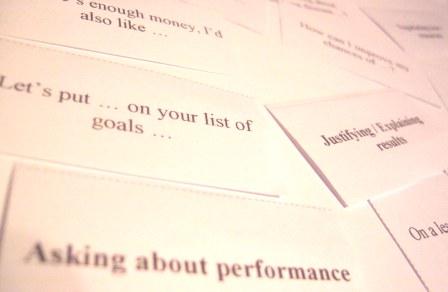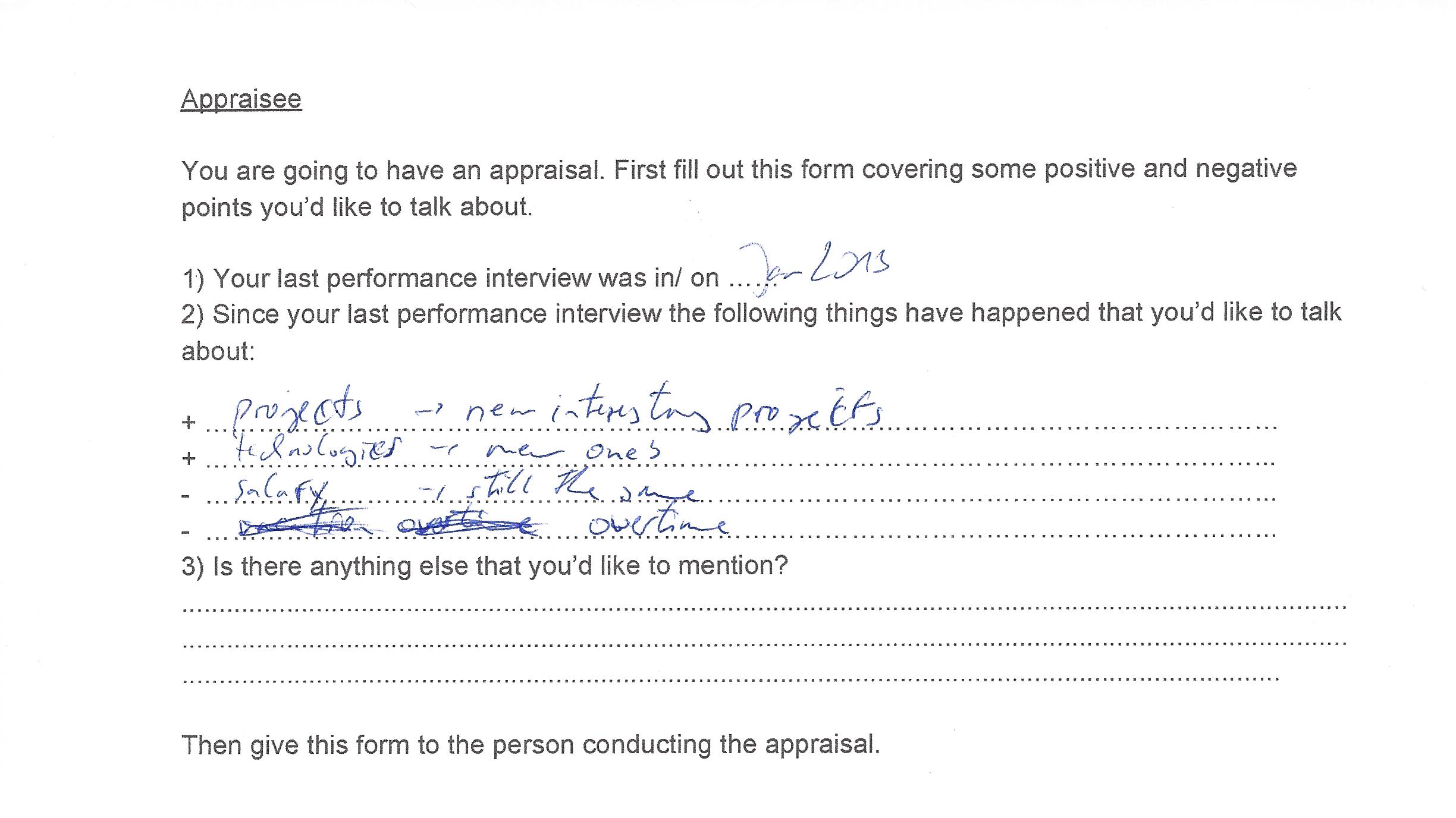In this post I’m going to talk about a lesson I did on Appraisals, chosen by the learners as part of Week 10 of a Decentralised syllabus.
For busy teachers the whole lesson plan can be downloaded here.
Background
One of the learners in the group identified giving Appraisals as a key part of his job, and others in the group talked about having regular informal and formal appraisals in English – with varying degrees of success! So it seemed like an appropriate topic.
Also, I think that exposing the learners to real-life, Jungle English is especially valuable for higher-level learners. In the above video, Richard Caldwell is talking about Listening skills, but I think that this applies across the board.
Throughout my teaching over the past few months, I have tried to expose the learners to as much authentic English as possible, and wanted to do that in this lesson using an extract from the UK comedy The Office. Watching The Office extract, it’s striking how many incomplete sentences, hesitations, stops and pauses there are, as opposed to the language as presented in standard teaching materials. I often say that in English, a real conversation should be like a tennis match -two people firing shots back and forth – rather than a ski race -one person going all the way down the track before the next person can go!
In my experience, dedicated learners also appreciate being exposed to real English that they can pick up and use, rather than grammar exercises they can’t. So I also decided to highlight the use of Discourse markers in this lesson which non-natives often find difficult, or shy away from using. This is building on previous work I did on heads and tails/ spoken grammar in Week 3.
The Lesson
Pre-Task
1) Open class discussion – I wrote on the WB the following question:
Are appraisals effective? Why or why not?
Some interesting vocabulary came up including the phrase of the day: It’s just a box-ticking exercise which the class found very amusing!
2) Draw this table on the WB and ask the learners to copy this into their notebooks. Tell them to leave plenty of room to write!
Appraisal Do’s and Don’ts
|
Manager Do’s |
Manager Don’ts |
|
Employee Do’s |
Employee Don’ts |
3) One pair then discusses Appraisal Do’s and Don’ts for the Manager, and the other groups discusses the same for Employees. After this both groups report back their answers and compare.
Task 1
4) Then the class watches the video ‘Big Keith’s Appraisal’. I transcribed the video but took out some of the words. I then replaced these words with the names of FRUIT. The worksheet for teachers is available here, the worksheet for learners here as Word docs.
5) Play the video again for learners to check their answers and write them on WB:
BANANA = though (used here as adverb, to soften the statement ‘It’s your job’)
APPLE = welcoming (participial adjective, modifing the noun ‘buffet’)
ORANGE = sort of (filler used to communicate vagueness)
KUMQUAT = equation (part of the idiom ‘Out of the equation’ – not involved in the situation, often used in connection with relationships)
PINEAPPLE = weren’t (this forms part of a If-clause)
MELON = Right (Discourse marker – Used here to start a introduce a new topic)
STARFRUIT = OK (Discourse marker – here used to again signal a new topic or question)
Teacher goes over functions of these words/ phrases (in brackets) and clarifies any questions the learners might have at this stage.
A further, more general question to ask the learners is:
Did the people in the video speak in sentences?
Elicit responses on why/ why not?
6) Learners discuss the appraisal in the video – how does it compare with the Do’s and Don’ts that they identified earlier (in stage 2)?
Extension Task/ Grammar- vocabulary awareness
7) Highlight or draw attention to the last two answers: RIGHT and OK and ask:
How do we use RIGHT and OK in everyday speech?
The learners told me they were ‘filler’ words, which is correct, but I then said we can define them more precisely as discourse markers or conversation markers – these words or phrases help us to organise our speech and conversation with other people.
8) Elicit other discourse markers from the learners if you can. Be careful to draw attention to the difference between written (e.g. however, furthermore) and spoken markers. If they don’t mention the following markers, then present them on the WB::
MIND YOU – Used to introduce a contrasting, or surprising idea. E.g. It’s freezing today isn’t it. Mind you, it was much colder last winter!
HANG ON/ HOLD ON – Used to prevent an interruption, or asking someone to wait before speaking or performing an action e.g. Hang on, we still need to finish this before we go home.
ANYWAY – Used when the speaker wants to change subjects, or to indicate that the speaker wants to end the conversation e.g. Anyway, we’d better go now, it’s late.
…..THEN? – Often used as a request for confirmation (see Schiffrin 1987: 256) e.g. A: Lisa and Simon have broken up B: Is she moving out then?
*You might want to emphasise the fact that these conversation markers are very common among native and expert speakers of English!
Task 2 – Pre-task
9) In preparation for the mock appraisal, I gave the learners the Appraisal vocabulary cards, cut up and mixed up, from Unit 15 of Upper Intermediate Business Result (OUP) which you can download for free from the Oxford University Press Teacher’s Resources site here (you have to sign up for membership – but the extra resources really useful).
The learners then have to put the phrases into the correct categories. This normally takes anywhere from 5 to 15 minutes.
10) I then gave the learners an A-A pair work sheet (A-A means they both have the same task or information, with A-B they have a different task or information). Learners filled in some specific points (2 positive, 2 negative) that they’d like to talk about in the appraisal. The worksheet is available here.
Task 2
11) The learners then ‘appraise’ each other in pairs. I told them to use the discourse markers from stage 7 and the vocabulary from stage 8 and monitored their performance.
12) I gave feedback on their performance during the appraisal, bringing up good points and things to improve on.
*Optional homework: Discourse Markers in Speech, p.56 English Vocabulary in Use: Upper Intermediate (CUP)
Conclusion
While I was monitoring I noticed the learners using ……then? at the end of questions and it was really surprising how natural they sounded. However, there was some confusion over whether to use though or Mind you to contrast ideas or statements. I explained that Mind you comes at the beginning of a sentence and introduces a contrasting idea as a phrase or clause, whereas in speech though often comes at the end e.g. Manchester United lost. It was a good game though.
I think that the learners found the use of conversation markers interesting, and will hopefully experiment with using them outside the classroom. I think it was also useful to role-play an appraisal. In Germany, companies are increasingly using these kind of interviews to gather data on performance and hire, fire and promote people!
Hope that you found this post useful – if you use this in class please drop me a line, any comments or improvements are welcome!
paul
References
McCarthy, M., O’Dell, F. English Vocabulary in Use: Upper Intermediate. Cambridge University Press.
Schiffrin, D. (1987). Discourse Markers. Cambridge University Press.


